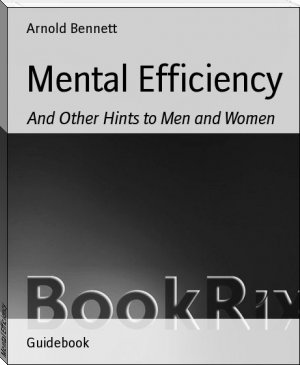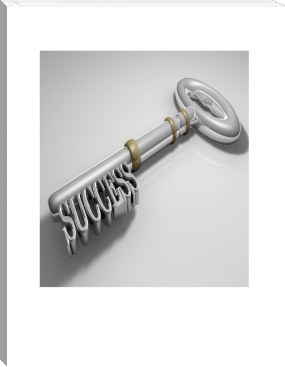Mental Efficiency by Arnold Bennett (top 100 books of all time checklist .TXT) 📖

- Author: Arnold Bennett
Book online «Mental Efficiency by Arnold Bennett (top 100 books of all time checklist .TXT) 📖». Author Arnold Bennett
Let me assert again that I am strongly in favour of cheap series of reprints. Their influence though not the very finest, is undisputably good. They are as great a boon as cheap bread. They are indispensable where money or space is limited, and in travelling. They decidedly help to educate a taste for books that are neither cheap nor handy; and the most luxurious collectors may not afford to ignore them entirely. But they have their limitations, their disadvantages. They cannot form the backbone of a "proper" library. They make, however, admirable embroidery to a library. My own would look rather plain if it was stripped of them.
THE PHILOSOPHY OF BOOK-BUYING
For some considerable time I have been living, as regards books, with the minimum of comfort and decency--with, in fact, the bare necessaries of life, such necessaries being, in my case, sundry dictionaries, Boswell, an atlas, Wordsworth, an encyclopaedia, Shakespere, Whitaker, some De Maupassant, a poetical anthology, Verlaine, Baudelaire, a natural history of my native county, an old directory of my native town, Sir Thomas Browne, Poe, Walpole's Letters, and a book of memoirs that I will not name. A curious list, you will say. Well, never mind! We do not all care to eat beefsteak and chip potatoes off an oak table, with a foaming quart to the right hand. We have our idiosyncrasies. The point is that I existed on the bare necessaries of life (very healthy--doctors say) for a long time. And then, just lately, I summoned energy and caused fifteen hundred volumes to be transported to me; and I arranged them on shelves; and I re-arranged them on shelves; and I left them to arrange themselves on shelves.
Well, you know, the way that I walk up and down in front of these volumes, whose faces I had half-forgotten, is perfectly infantile. It is like the way of a child at a menagerie. There, in its cage, is that 1839 edition of Shelley, edited by Mrs. Shelley, that I once nearly sold to the British Museum because the Keeper of Printed Books thought he hadn't got a copy--only he had! And there, in a cage by himself, because of his terrible hugeness, is the 1652 Paris edition of Montaigne's Essays. And so I might continue, and so I would continue, were it not essential that I come to my argument.
Do you suppose that the presence of these books, after our long separation, is making me read more than I did? Do you suppose I am engaged in looking up my favourite passages? Not a bit. The other evening I had a long tram journey, and, before starting, I tried to select a book to take with me. I couldn't find one to suit just the tram-mood. As I had to _catch_ the tram I was obliged to settle on something, and in the end I went off with nothing more original than "Hamlet," which I am really too familiar with.... Then I bought an evening paper, and read it all through, including advertisements. So I said to myself: "This is a nice result of all my trouble to resume company with some of my books!" However, as I have long since ceased to be surprised at the eccentric manner in which human nature refuses to act as one would have expected it to act, I was able to keep calm and unashamed during this extraordinary experience. And I am still walking up and down in front of my books and enjoying them without reading them.
I wish to argue that a great deal of cant is talked (and written) about reading. Papers such as the "Anthenaeum," which nevertheless I peruse with joy from end to end every week, can scarcely notice a new edition of a classic without expressing, in a grieved and pessimistic tone, the fear that more people buy these agreeable editions than read them. And if it is so? What then? Are we only to buy the books that we read? The question has merely to be thus bluntly put, and it answers itself. All impassioned bookmen, except a few who devote their whole lives to reading, have rows of books on their shelves which they have never read, and which they never will read. I know that I have hundreds such. My eye rests on the works of Berkeley in three volumes, with a preface by the Right Honourable Arthur James Balfour. I cannot conceive the circumstances under which I shall ever read Berkeley; but I do not regret having bought him in a good edition, and I would buy him again if I had him not; for when I look at him some of his virtue passes into me; I am the better for him. A certain aroma of philosophy informs my soul, and I am less crude than I should otherwise be. This is not fancy, but fact.
Taking Berkeley simply as an instance, I will utilise him a little further. I ought to have read Berkeley, you say; just as I ought to have read Spenser, Ben Jonson, George Eliot, Victor Hugo. Not at all. There is no "ought" about it. If the mass of obtainable first-class literature were, as it was perhaps a century ago, not too large to be assimilated by a man of ordinary limited leisure _in_ his leisure and during the first half of his life, then possibly there might be an "ought" about it. But the mass has grown unmanageable, even by those robust professional readers who can "grapple with whole libraries." And I am not a professional reader. I am a writer, just as I might be a hotel-keeper, a solicitor, a doctor, a grocer, or an earthenware manufacturer. I read in my scanty spare time, and I don't read in all my spare time, either. I have other distractions. I read what I feel inclined to read, and I am conscious of no duty to finish a book that I don't care to finish. I read in my leisure, not from a sense of duty, not to improve myself, but solely because it gives me pleasure to read. Sometimes it takes me a month to get through one book. I expect my case is quite an average case. But am I going to fetter my buying to my reading? Not exactly! I want to have lots of books on my shelves because I know they are good, because I know they would amuse me, because I like to look at them, and because one day I might have a caprice to read them. (Berkeley, even thy turn may come!) In short, I want them because I want them. And shall I be deterred from possessing them by the fear of some sequestered and singular person, some person who has read vastly but who doesn't know the difference between a J.S. Muria cigar and an R.P. Muria, strolling in and bullying me with the dreadful query: "_Sir, do you read your books?_"
Therefore I say: In buying a book, be influenced by two considerations only. Are you reasonably sure that it is a good book? Have you a desire to possess it? Do not be influenced by the probability or the improbability of your reading it. After all, one does read a certain proportion of what one buys. And further, instinct counts. The man who spends half a crown on Stubbs's "Early Plantagenets" instead of going into the Gaiety pit to see "The Spring Chicken," will probably be the sort of man who can suck goodness out of Stubbs's "Early Plantagenets" years before he bestirs himself to read it.
VII
SUCCESS
CANDID REMARKS
There are times when the whole free and enlightened Press of the United Kingdom seems to become strangely interested in the subject of "success," of getting on in life. We are passing through such a period now. It would be difficult to name the prominent journalists who have not lately written, in some form or another, about success. Most singular phenomenon of all, Dr. Emil Reich has left Plato, duchesses, and Claridge's Hotel, in order to instruct the million readers of a morning paper in the principles of success! What the million readers thought of the Doctor's stirring and strenuous sentences I will not imagine; but I know what I thought, as a plain man. After taking due cognizance of his airy play with the "constants" and "variables" of success, after watching him treat "energetics" (his wonderful new name for the "science" of success) as though because he had made it end in "ics" it resembled mathematics, I thought that the sublime and venerable art of mystification could no further go. If my fellow-pilgrim through this vale of woe, the average young man who arrives at Waterloo at 9.40 every morning with a cigarette in his mouth and a second-class season over his heart and vague aspirations in his soul, was half as mystified as I was, he has probably ere this decided that the science of success has all the disadvantages of algebra without any of the advantages of cricket, and that he may as well leave it alone lest evil should befall him. On the off-chance that he has come as yet to no decision about the science of success, I am determined to deal with the subject in a disturbingly candid manner. I feel that it is as dangerous to tell the truth about success as it is to tell the truth about the United States; but being thoroughly accustomed to the whistle of bullets round my head, I will nevertheless try.
Most writers on success are, through sheer goodness of heart, wickedly disingenuous. For the basis of their argument is that nearly any one who gives his mind to it can achieve success. This is, to put it briefly, untrue. The very central idea of success is separation from the multitude of plain men; it is perhaps the only idea common to all the various sorts of success--differentiation from the crowd. To address the population at large, and tell it how to separate itself from itself, is merely silly. I am now, of course, using the word success in its ordinary sense. If human nature were more perfect than it is, success in life would mean an intimate knowledge of one's self and the achievement of a philosophic inward calm, and such a goal might well be reached by the majority of mortals. But to us success signifies something else. It may be divided into four branches: (1) Distinction in pure or applied science. This is the least gross of all forms of success as we regard it, for it frequently implies poverty, and it does not by any means always imply fame. (2) Distinction in the arts. Fame and adulation are usually implied in this, though they do not commonly bring riches with them. (3) Direct influence and power over the material lives of other men; that is to say, distinction in politics, national or local. (4) Success in amassing money. This last is the commonest and easiest. Most forms of success will fall under one of these heads. Are they possible to that renowned and much-flattered person, the man in the street? They are not, and well you know it, all you professors of the science of success! Only a small minority of us can even become rich.
Happily, while it is true that success in its common acceptation is,





Comments (0)